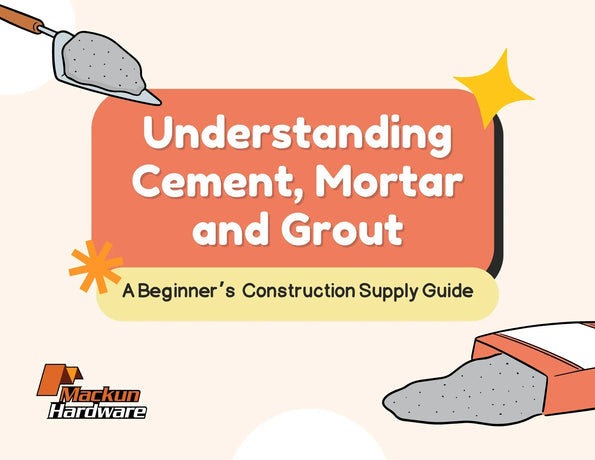Heads up!
Limited stock on popular items.
Verify availability before you order!
- No products in the cart.
Heads up!
Limited stock on popular items.
Verify availability before you order!

In the construction industry, cement, mortar, and grout are essential materials. They may look alike, but each has a specific purpose. Choosing the wrong one can compromise your project, so it’s important to understand their differences before you make your purchase.
Made from limestone, clay, shells, and silica, cement forms a hardening paste when mixed with water. However, it is not typically used as a standalone construction material.

Instead, cement acts as a binding ingredient with sand, gravel, and other aggregates to form mortar, grout, and concrete. The most common type, Portland cement, is used to create concrete for buildings, bridges, and other general construction.
Mortar is a mix of cement, sand, and water, sometimes with lime added. Its primary function is to hold bricks, stones, and other masonry units together, creating strong and stable structures. Mortar comes in various types, each with different strengths and uses.

Stronger types are used for building foundations, while less durable ones offer a cost-effective alternative for light-duty applications.
Grout is another cement-based material. It consists of cement, water, and sometimes sand or other additives. Unlike mortar, grout has a higher water content, making it flowable and ideal for filling gaps and holes.

It seals spaces between tiles, preventing moisture and debris buildup, and reinforces masonry walls by filling voids. Grout is available in sanded, unsanded, and epoxy-based types, with each being more suitable for different applications.
While cement, mortar, and grout all look similar, they have different ingredients and applications.
Cement is a binding ingredient rarely used on its own. It is most often mixed with other materials to form mortar, grout, and concrete.
Mortar is a paste-like material used for bonding bricks and stones.
Grout is a more fluid mix designed for filling gaps and sealing joints.
Now that you understand these materials better, you'll be more confident in choosing the right one for your project. As always, we recommend selecting trusted brands to ensure the best results.
We hope this guide was helpful! If you need more assistance, our team at Mackun Hardware is always ready to help.
Check out our selection of cement, mortar, grout and their prices here.

For inquiries and orders you may visit or contact us:
Address: RW Building, Sergio Osmeña Street Cagayan de Oro City, Misamis Oriental 9000
Contact No. : +63 956 037 2805
| Product | Price | Quantity | Options | |||||
|---|---|---|---|---|---|---|---|---|
| Features |
| Availability: |
| Price |
| Options |
| Actions |
